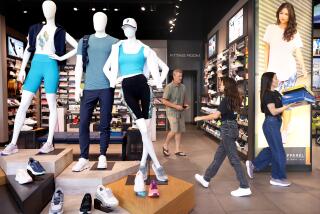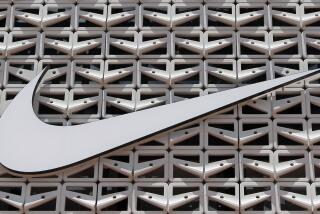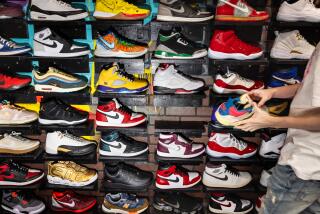Shoe Company K-Swiss Expects to Overcome Stock Slide in Long Run
WESTLAKE VILLAGE — Athletic shoe manufacturer K-Swiss at first glance looks like a mystery.
The company finished 1999 with huge increases in sales and earnings, yet its stock has declined steadily since hitting a high near $60 last June. The stock declined 20.27% for the first quarter, closing Friday at $14.81
Hardly the kind of performance you might expect from a company that also finished the year with $53 million in cash on hand and no debt.
But the stock’s slide is easily explainable despite the “fabulous year” K-Swiss had in 1999, according to Steven Nichols, president and chairman.
K-Swiss shares have dropped because the company announced that retailers have ordered fewer of its shoes this year, Nichols explained, noting that the drop in orders is the result of an industrywide slump that has put one of the company’s main customers into Chapter 7 (liquidation) bankruptcy and caused problems for others as well.
*
Nichols said the athletic shoe industry is paying the price for years of overexpansion and overbuilding of retail stores. He calls the industry slump a “natural correction” to the overbuilding of retail stores that has been going on for years, adding millions of square feet of shoe store space.
“As recently as 18 months ago, the retailers were still opening new stores,” he said. “There are more square feet of retail space devoted to athletic shoes than there are feet to fill those shoes.”
Analysts agreed with Nichols’ assessment of his company’s and the industry’s situation.
Analyst John Shanley of First Security Van Kasper said K-Swiss shares, which rocketed last year when its sales and earnings climbed, plunged later because of the company’s announcements about lower future orders and because of “significant changes in the athletic shoe retail sector.”
The company’s U.S. orders for January through June this year fell 27% to $95.3 million from $131.5 million last year, according to its annual report for the year ended Dec. 31. Although international orders rose 16% to $10.4 million from $9.01 million, the increase was too small to offset the large drop in U.S. orders.
Shanley said the lower K-Swiss orders reflect an overall slump in the athletic shoe industry, which he said has suffered “a 12% contraction in the number of athletic retail stores in the United States, some of them big customers of K-Swiss.”
Shanley added, however, that the consolidation was “exactly what the industry needed” after substantial overbuilding of retail stores.
Shanley said the bankruptcy of one of K-Swiss’ biggest customers, Just for Feet, represents in the long term “a very positive development for the entire U.S. athletic shoe industry,” both for retailers and manufacturers, despite its immediate negative impact on K-Swiss.
The Just for Feet liquidation will remove about 2.5 million square feet of athletic shoe store space in addition to the 750,000 square feet of store space the company already shuttered over the last several months.
Shanley said long-term prospects for K-Swiss look good, even though he has downgraded his rating on the stock to “hold” from his previous “buy” recommendation. He has sharply lowered his year 2000 earnings-per-share estimate for K-Swiss, dropping it to $1.10 from his previous estimate of $2.
Analyst Brenda Gall of Merrill Lynch has reduced her estimate on K-Swiss future earnings to $1 per share for this year, down from her previous estimate of $2.99 per share, but she said the company has good long-term prospects and appears already to be recovering somewhat from the lumps it took when it announced the lowered level of future orders.
“I think the worst is over for them,” Gall said, “but it’s going to take a while for the stock to pick up, even though reports from retailers suggest that (K-Swiss shoes) are selling a little better than might have been expected on the basis of their lower orders.”
“Their balance sheet is exceptionally strong,” added Gall, who said the company’s ongoing stock buyback program--in which K-Swiss has spent $37 million in the last two years buying back its stock--should also bolster the share price.
Shanley believes retailer orders for K-Swiss shoes will improve later this year, but not until the fourth quarter.
“They have a lot of upside potential in the fourth quarter, which is very important because it’s the big back-to-school season, but they’ve already missed the third quarter because they’ve closed the books on those orders,” Shanley said.
K-Swiss ranked 10th among the top 10 athletic shoe store brands in terms of percentage of annual retail sales in 1999, according to a report by First Security Van Kasper. The report said K-Swiss garnered 1.2% of the dollar total of U.S. retail athletic footwear sales, compared with 46.6% for industry leader Nike, 11.8% for Reebok, and considerably smaller shares for the seven others in the top 10. The report showed the K-Swiss share of the footwear market has more than doubled from 0.5% in 1996.
The best-selling K-Swiss model is a white tennis shoe, the Classic, that was a performance tennis shoe when it was first sold in 1966 but has since become “everyday footwear.” It sells for $55.
Nichols and analysts both say K-Swiss has maintained its cachet through the years in part by being selective about where it sells its shoes, which range in price from $55 to $70. For example, it doesn’t sell in Sears, Mervyn’s, or Big 5 stores in California.
Recent events won’t change the basic K-Swiss strategy, Nichols said. That strategy has always been to concentrate on “very focused product offerings, very focused marketing and highly select distribution.”
“It’s a strategy that has served us well in the long run,” Nichols said.
“Anything can happen in the short run, but we don’t have a short-run mentality.”
Nichols added that K-Swiss expects it will still turn a tidy profit on respectable sales this year despite the industry downturn.
“The year 2000 will be down for us, but it will still be the second most profitable in our 34-year history, so whether it’s going to be a positive year or a negative year depends on how you look at it,” he said.
(BEGIN TEXT OF INFOBOX / INFOGRAPHIC)
K-Swiss
A slump in the retail shoe business is blamed for a decline in the share value of tennis shoe manufacturer K-Swiss of Westlake Village. Analysts do not expect a fast recovery.
*
Source: Bridge Information Systems
More to Read
Inside the business of entertainment
The Wide Shot brings you news, analysis and insights on everything from streaming wars to production — and what it all means for the future.
You may occasionally receive promotional content from the Los Angeles Times.










